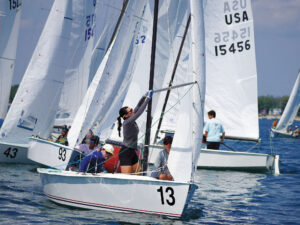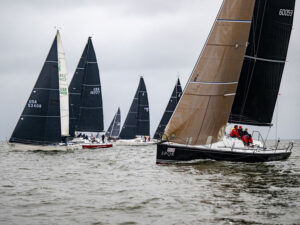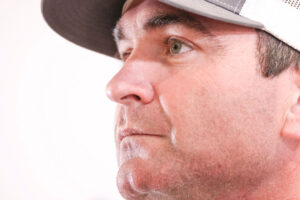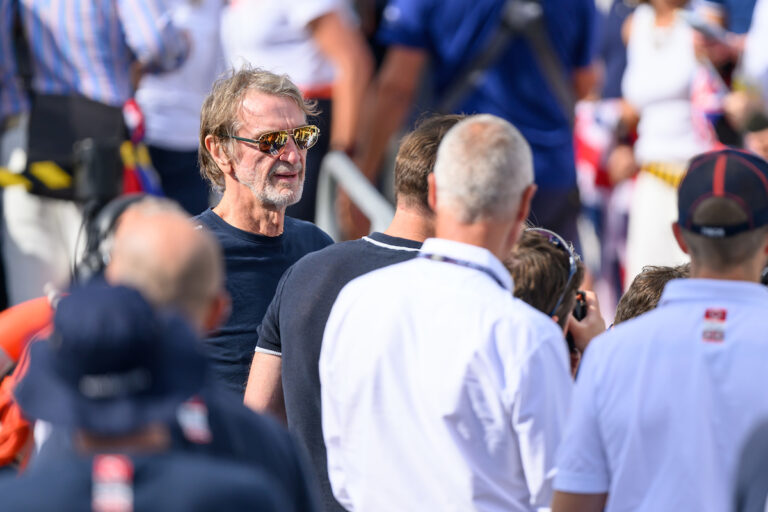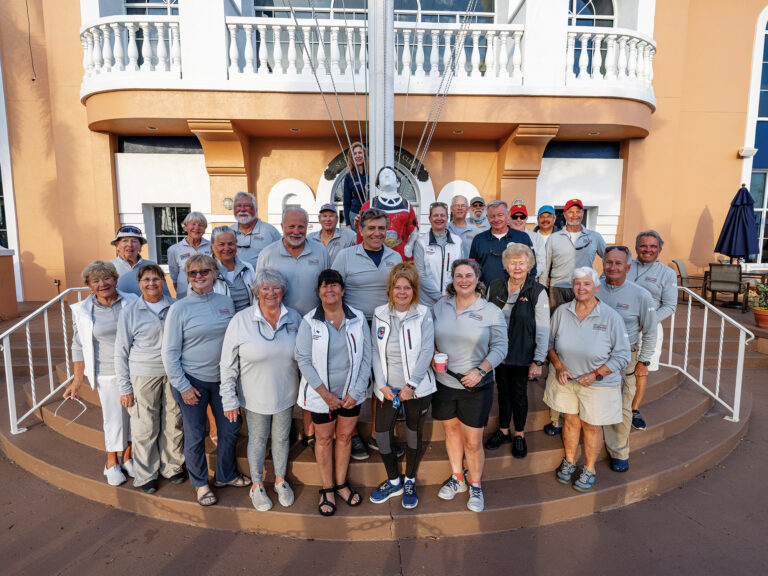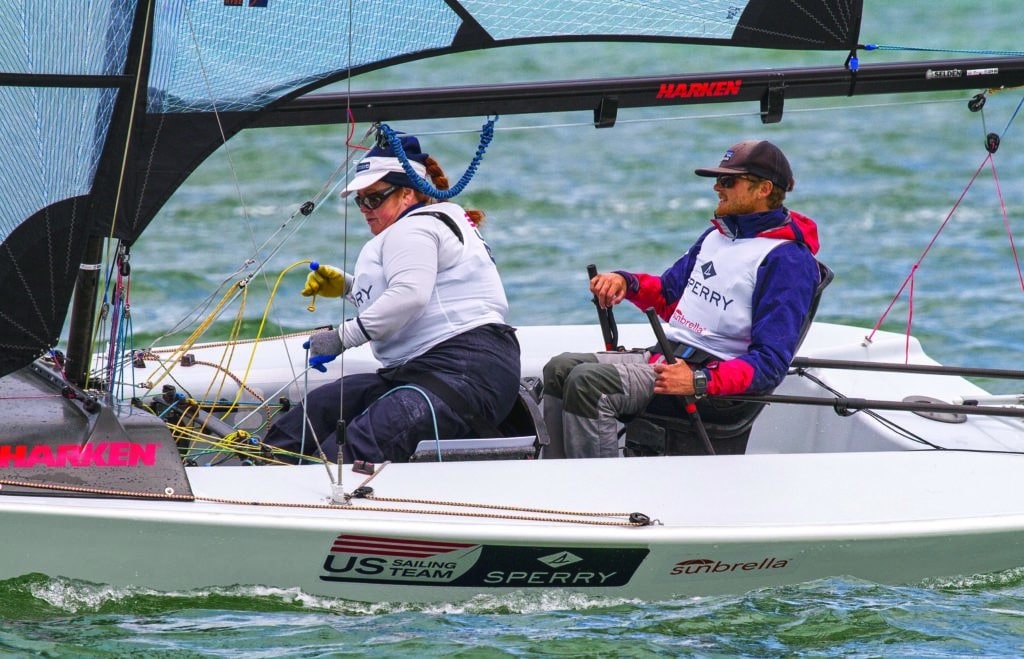
Para World Sailing Championships 2015
From the moment she stumbled off a dock and broke her back, Maureen McKinnon never really felt true despair. Paralyzed from the waist down, the 51-year-old from Marblehead, Massachusetts, was determined to carry on and find a competitive outlet. It took some searching, connections and coincidence, but eventually that outlet became high-level international sailing. She reached the pinnacle of the sport, winning a gold medal with Nick Scandone in the 2008 Paralympic Games. Now, eight years later, she is intensely focused on this year’s Games in Rio with helmsman Ryan Porteous, sailing the SKUD 18. In speaking engagements, her themes are empowerment, disability awareness and determination, which she says resonates with her audiences. “It’s an unsaid message of ‘I can do it with this wheelchair, as a single mother, skippers dying, kid with cancer,’” she says, summarizing her life’s many curveballs. “Damn it, what’s your excuse?”
McKinnon’s re-entry into sailing after the accident was not assured. When she looks back today, she vividly recalls the struggle that accompanied her initial attempt. “It was a disaster,” she says. “My body was dangling in the cockpit. I had one arm wrapped around the stanchion, trying to trim the jib at the same time with my other arm.”
She had loved sailing before her injury and wanted to make it part of her life again. Not easily discouraged, she next tried a boat specifically designed for the disabled. Unfortunately, it was poorly configured, and she was stuck on the low side of the boat half the time. After one outing, she wheeled down the dock in tears.
“If that is disabled sailing, count me out,” she recalls thinking. “I want no part of being just a passenger.”
A go-getter, she found other outlets to satiate her athletic desire, such as kayaking, wheelchair basketball and sit-skiing. Then, several years later, on the porch of Corinthian YC in Marblehead, she rolled up to a man in a wheelchair and asked what, she says in hindsight, seems like a ridiculous question: “So, is your wife sailing here?”
The man in the wheelchair was Rick Doerr, a top-ranked disabled sailor. No, his wife wasn’t sailing. He was in town racing in the Sonar class, which fields both disabled and able-bodied teams. She was intrigued; perhaps there was a good way for to her to get back into competitive sailing. In an unlikely series of events, McKinnon found herself sailing in the Sonar Disabled Worlds a few months later. A travel ban in the days following 9/11 had prevented crews from flying in, so she heeded a last-minute urgent request for disabled sailors within driving distance. “The towers were still burning in the distance,” she recalls. “It could not have been set in a more dramatic fashion.”
Much more than just a call to action, this event proved a pivotal point for McKinnon’s sailing. In the last-minute crew shuffle, she was coincidentally teamed up with that same guy from the porch, Rick Doerr.
An able-bodied sailor rounded out their three-person Sonar team, and she recalls a particularly heavy-air race in which their able-bodied substitute was “freaking out, wanting to go in because he had two paraplegics on board.”
Doerr and McKinnon gave each other a menacing nod and smile behind his back, as if to say, “We’re not going back in.” Doerr was so impressed with her abilities, he drafted McKinnon onto his Sonar campaign for the 2004 Paralympic Games in Athens. Soon after, she became the first woman named to the U.S. disabled sailing team.
Since then, McKinnon has been consumed with the Paralympic experience. After her Athens bid, she teamed up with Scandone and switched to the SKUD, a more modern, mixed-gender boat specifically designed for Paralympic sailing. With the crew playing the main, jib and an asymmetric spinnaker, it’s a physical boat. Though McKinnon is athletically built, she had thought of herself as having everything going against her as a sailor: She’s a paraplegic, she’s a woman, and she’s stocky. For the SKUD, however, this combination turned out to be an ideal mix. “It was my larger size, build and strength that worked to my advantage on the Sonar,” she says. “Where I was worried was that the SKUD required remarkable hand speed and agility, not the brawn required of a Sonar.”
The campaign is not just about winning, she adds, because Paralympic sailing represents what is possible. Its likely absence from the 2020 Games is something she struggles with. “Without that pinnacle of Paralympic sailing, that example goes away, that you can do this on the world stage,” she says. This time, of course, she’ll share the experience with Porteous, 23, with whom she paired in late 2014. Perhaps coincidentally, when he was 18, a freshman at UC Santa Barbara, he slipped on a dock and suffered a spinal cord injury, partially paralyzing himself from the neck down. Before his injury, he was an intensely driven athlete, but sailing was more pasttime than primary sport. Whereas McKinnon once benefited from Scandone’s mentoring, with him as the more experienced of the pair, this time the roles are reversed. “[Porteous] really listens to me,” she says. “He accepts my terms as his crew.”
As a physics major at UCSB, Porteous has an analytical engineer mind, McKinnon adds, and his California surfer “chill” balances her East Coast uptightness. The vibe is good going into Rio, she says. From good vibrations, the Beach Boys sang, come excitations.

